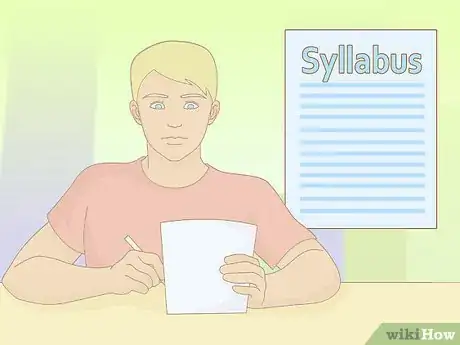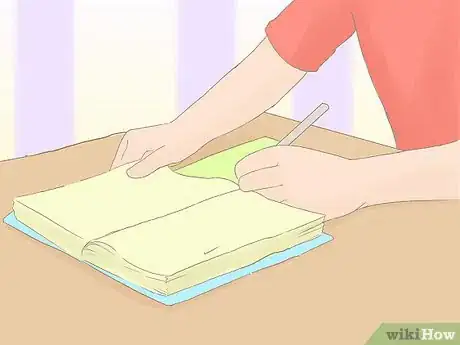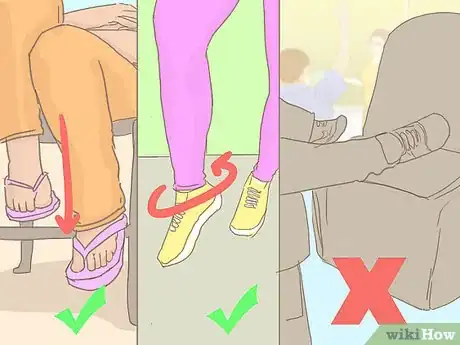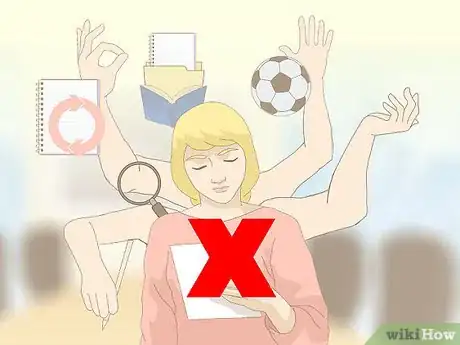This article was co-authored by Michelle Golden, PhD. Michelle Golden is an English teacher in Athens, Georgia. She received her MA in Language Arts Teacher Education in 2008 and received her PhD in English from Georgia State University in 2015.
There are 15 references cited in this article, which can be found at the bottom of the page.
This article has been viewed 48,085 times.
Most people have had to endure long lectures either in a classroom or the workplace. But the human brain and body aren't hardwired to sit and pay attention for long periods of time.[1] In addition, you may have factors such as illness, insomnia, or even just a boring lecturer that make it difficult to get through lectures. But by mentally and physically preparing before the lecture and then engaging in the lecture in different ways, such as stretching your legs every few minutes, you can successfully get through long lectures.
Steps
Getting Ready for the Lecture
-
1Go over the syllabus or program. Most courses will have a syllabus or a program to give participants an idea of assignments or requirements. Go over the syllabus or program before each lecture so you know what to expect and can prepare any material or assignments so you don't get lost.[2]
- Break down the assignments lecture by lecture. This will help you prioritize what you need to get through the next lecture.[3]
- Ask friends or the professor if you have any questions about the upcoming lecture or reading.
-
2Finish readings. Most lectures are accompanied by required readings or assignments. Make sure to finish any readings or assignments so that you can grasp the concepts of the lecture and not get bored. This will also let you participate in discussions, which can also help you get through lectures.[4]
- Take notes on the reading as you read, which can help you in the discussions and may help you focus more effectively. You only need to write down the most important information.
- Remember that arriving prepared for your lecture can make it less painful and more manageable.
Advertisement -
3Eat and drink for alertness. Making sure that your body and brain are fueled properly can help you stay alert during a long lecture. Having a light meal or snack and drinking enough before your lecture may help you get through it more easily.[5]
- Avoid heavy meals before the lecture because these can divert blood from your brain for digestion and make you sluggish.[6] Soup or a salad with some protein, cereal and milk, or peanut butter on toast are all good, light choices that will give you energy to get through the lecture without making your drowsy.[7]
- Hydrate yourself properly before the lecture. One of the symptoms of dehydration is fatigue and drinking enough water in the hours before your lecture can make it easier to get through it.[8]
- Be aware that consuming alcohol the evening before a lecture can dehydrate you.[9]
- Have a cup of coffee or tea before lecture if you like, but be aware that there is no evidence that it will increase mental alertness.[10]
- Chew mints or mint gum. Studies have shown that mints or mint gum can increase alertness and how you process information.[11]
- Avoid energy drinks and too much sugar. They may increase alertness for a short period, but often cause crashes in energy and increase sleepiness, which may make a long lecture seem endless.[12]
-
4Dress comfortably. Any discomfort you have can make a long lecture seem like torture. Choosing comfortable clothing and shoes can help you settle into a lecture and pay close attention for the duration of it.[13]
- Wear pants and tops that are not too tight. For example, skinny jeans might make your legs fall asleep.[14]
- Put on comfortable shoes. For example, shoes that are too tight might distract you during the lecture. Or, you might get blisters from hiking across campus in high heels and that could also distract you during the lecture. Try a cute pair of ballet flats instead.[15]
- Remember that you can look stylish and cute while being comfortable.
-
5Meet a friend or classmate before the lecture. Having a buddy who you can lean on during a lecture can make the time go by more quickly. Ask a friend or one of your classmates to meet you outside of the classroom or at a café before class so that you can go and sit together.
- Having a buddy can help momentarily distract you from the boredom of a class. Just remember that you don't want to interrupt the professor or teacher while you're momentarily distracting yourself.
Staying Alert during the Lecture
-
1
-
2Stretch your legs. Between breaks in the lecture, do small stretches or movements with your legs. This can help keep you alert and circulate blood so your legs and arms don't fall asleep.
- Push your legs forward if you can and push and pull your toes back towards you.
- Do ankle circles or even wrist circles.
- Make sure your stretching doesn't interrupt the lecturer or your fellow classmates.
-
3Pop a piece of gum or a mint. Chewing gum or sucking on a mint can increase your alertness and it may also improve your mood. Having some gum and/or mints can make a long lecture go by more quickly.
- Opt for peppermint if possible: the smell of peppermint oil or peppermint gum may stimulate your memory to retain information.[22]
-
4Eat a snack. Depending on the length of your lecture, chances are it coincides with a mealtime. Having a light snack during your long lecture can help increase your alertness and may make it go by more quickly.
- Have a piece of cheese, fruit, or some pretzels.
- Make sure that your snack packaging or chewing doesn't interrupt the lecture in any way.
-
5Doodle a bit. There is some evidence that doodling a bit or doing something creative like rolling a piece of clay can stimulate alertness.[23] Try drawing small images or rolling something on your desk or between your fingers to make the lecture go by more quickly.[24]
- Keep your doodling or other activities to a minimum and continue to pay attention to the lecture.
- Avoid allowing your doodling to disrupt other members of the class or the lecturer.
-
6Take a brief break. Most professors or teachers will allow students to take a break during long lectures. Take this opportunity to stretch your legs and get your blood circulating, which can not only make the time go by more quickly but also make you more alert.[25]
Engaging in the Lecture
-
1Write notes by hand. Taking notes can help you to stay alert and pay attention during the lecture. You will also be more likely to remember the lecture if you take notes.
- Write only the most important information and continue to actively listen while you write.
- Take your notes by hand. Most people learn more effectively by taking hand-written notes than by typing their notes. In addition, this can also make a long lecture go by more quickly.[28]
-
2Engage in discussions. Most professors or teachers will allow students to ask questions or stimulate discussions during longer lectures. Participate in the lecture by asking any questions you have or make points during a discussion to help keep yourself alert and active.
- Raise your hand to ask questions or make a point during a discussion. Remember to not interrupt the lecture at an inconvenient moment.
-
3Show interest in the subject. Chances are that you will have to take a class as a requirement at some point and it may be of no interest to you or relate to your course of study. Find a way to engage in the lecture or discussion by relating it to your interest in some way, which may make the lecture—and course—more bearable.
- Be aware that even the most divergent subjects can have topics that overlap. For example, perhaps you have to take a class on German history and you're a pre-med major. Think about what you've learned in your classes about Germany and medicine and then use this information to make a contribution to the lecture.
- Ask questions to the professor or your fellow students. Preface your inquiries with a sentence or two about your position. For example, you can say “I'm not a history major, but I took a class on medical ethics and I was wondering how this was applied to the victims of war.”
-
4Follow up on difficult information. You may be having a hard time understanding your lecture, which can make it a marathon to endure. Studies have shown that most students only capture about 20-40% of the material that they're presented in part because they don't understand the way it is presented. By following up in class on difficult information, you may not only be able to get through your lecture, but also clarify hard concepts for you and your classmates.
- Ask questions during the lecture if possible. You can inquire about points the professor has made or something that you didn't understand from the readings or assignments.
- Keep a list of points you need clarified if the professor doesn't accept questions during the lecture. This may help keep you engaged and awake during the lecture.
- Try and stay away from asking your neighbor questions, as it can disrupt the professor and other students.
-
5Avoid multitasking and distractions. While it may be tempting, do not do any activities such as answering emails, texting, or reading during a lecture. Not only is this disrespectful to the instructor and your fellow students, but can actually make the time go by less quickly.
Community Q&A
-
QuestionHow do I keep up with the lecture while writing notes?
 Community AnswerUse a laptop or an ipad to write notes instead of handwriting. Then when you go home, you can hand write them if you wish, as it stimulates your brain more.
Community AnswerUse a laptop or an ipad to write notes instead of handwriting. Then when you go home, you can hand write them if you wish, as it stimulates your brain more.
Warnings
- Avoid "catching a quick nap" or "just shutting your eyes for a minute". This may make you fall asleep.⧼thumbs_response⧽
References
- ↑ http://www.ascd.org/publications/educational-leadership/dec92/vol50/num04/What-Brain-Research-Says-About-Paying-Attention.aspx
- ↑ http://why.ryerson.ca/survive-3-hour-lecture/
- ↑ http://why.ryerson.ca/survive-3-hour-lecture/
- ↑ http://why.ryerson.ca/survive-3-hour-lecture/
- ↑ http://www.huffingtonpost.com/2013/03/11/foods-for-energy_n_2852761.html
- ↑ https://sleepfoundation.org/sleep-topics/food-and-sleep
- ↑ https://sleepfoundation.org/sleep-topics/food-and-sleep
- ↑ http://www.mayoclinic.org/diseases-conditions/dehydration/basics/symptoms/con-20030056
- ↑ https://sleepfoundation.org/sleep-topics/food-and-sleep/page/0/1
- ↑ http://www.ncbi.nlm.nih.gov/pubmed/23108937
- ↑ https://www.psychologytoday.com/blog/your-brain-food/201208/gum-chewing-is-good-the-brain
- ↑ https://sleepfoundation.org/sleep-topics/food-and-sleep/page/0/1
- ↑ http://why.ryerson.ca/survive-3-hour-lecture/
- ↑ http://why.ryerson.ca/survive-3-hour-lecture/
- ↑ http://why.ryerson.ca/survive-3-hour-lecture/
- ↑ http://blog.harvardvanguard.org/2012/03/stand-up-straight-improving-your-posture/
- ↑ http://blog.harvardvanguard.org/2012/03/stand-up-straight-improving-your-posture/
- ↑ http://blog.harvardvanguard.org/2012/03/stand-up-straight-improving-your-posture/
- ↑ http://blog.harvardvanguard.org/2012/03/stand-up-straight-improving-your-posture/
- ↑ http://blog.harvardvanguard.org/2012/03/stand-up-straight-improving-your-posture/
- ↑ http://blog.harvardvanguard.org/2012/03/stand-up-straight-improving-your-posture/
- ↑ http://jass.neuro.wisc.edu/2012/01/Lab%20603%20Group%205%20The%20Effect%20of%20Peppermint%20on%20Memory%20Performance.pdf
- ↑ http://www.cdl.org/articles/15-strategies-for-managing-attention/
- ↑ http://www.cdl.org/articles/15-strategies-for-managing-attention/
- ↑ http://www.cdl.org/articles/15-strategies-for-managing-attention/
- ↑ http://www.health.harvard.edu/press_releases/regular-exercise-releases-brain-chemicals-key-for-memory-concentration-and-mental-sharpness
- ↑ http://www.theguardian.com/money/2010/jul/24/secret-to-improving-concentration
- ↑ http://www.scientificamerican.com/article/a-learning-secret-don-t-take-notes-with-a-laptop/









































































